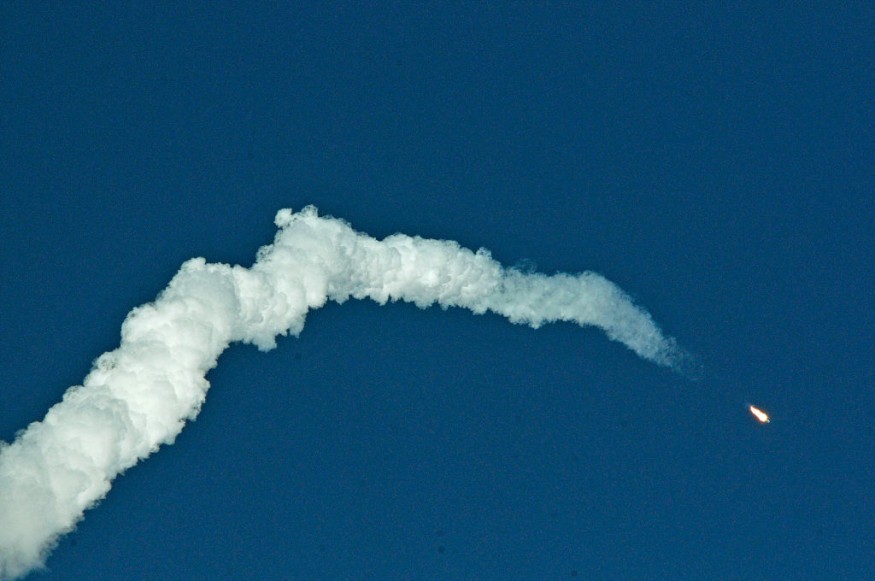As more rocket propulsion emissions enter the Earth's atmosphere, space experts at the University of Nicosia in Cyprus warn that pollution continues to grow even after SpaceX, Blue Origin and Virgin Galactic have started using reusable rockets for their space missions.
A new study shows a simulation of a reusable rocket and discovers that it still has a significant propulsion emission that doesn't help reduce pollution.

Atmospheric Pollution Worsens From Reusable Rockets
Researchers from the University of Nicosia studied the impact of gases and plumes at various elevations. According to them, space businesses should address the consequences of propulsion emissions, even with reusable rockets like Falcon 9 from Space X, VSS Unity from Virgin Galactic and New Shepard from Blue Horizon.
A pair of scientists created a computer simulation of a SpaceX Falcon 9 rocket exploding into orbit. They learned that the propulsion emissions of reusable rockets release can still contribute to global warming.
"Improved understanding of rocket emissions requires modeling and simulation of fluid dynamics of rocket exhaust gases into the atmosphere," said co-author Dimitris Drikakis (via Phys.org).
Ioannis Kokkinakis, a co-author of the study, stated that exhaust emissions should not be overlooked to lessen pollution. He added that too many space launches might have a cumulative influence on Earth's climate.
Rocket Propulsion Emissions Can Stay Up
The study also discovered that thermal nitrogen oxide (NOx) from rockets persists at high altitudes. Spacecrafts like SpaceX Falcon 9 can release carbon dioxide that remains in the mesosphere. Both scenarios can raise the temperature of the Earth's atmosphere, accelerating global warming and pollution.
According to an Engineering and Technology report, these emissions might alter the composition of the mesosphere. While air currents will progressively move and mix the CO2 from the exhaust throughout the atmosphere, ultimately bringing it back to naturally occurring levels, the time scale over which this happens is unknown.
According to the findings, several rocket launches can result in carbon dioxide buildup and climate change acceleration. These two are known for causing pollution on Earth.
In the worst-case scenario, enough NOx might be created when it takes the rocket to reach a height of 10 kilometers to contaminate over 2km3 of atmospheric air with NOx concentrations dangerous to human health.
Drikakis hopes that the commercial flight companies such as SpaceX, Virgin Galactic, Blue Origin and their associated engine manufacturers will consider the effects of the rocket engine exhaust pollution in their future designs.
Is Carbon Dioxide Not A Problem?
Meanwhile, Interesting Engineering said rockets aren't to blame for the amount of carbon dioxide released into the atmosphere. A normal launch emits roughly the same amount of CO2 as a day-long commercial flight, which is hundreds of tons.
That's significantly more carbon than the typical person would produce in their lifetime. Still, it's a drop in the bucket compared to the 900 million tons of CO2 emitted yearly by the aviation sector before the pandemic.
"We don't care about a rocket's carbon footprint. That's irrelevant," said Dr. Martin Ross, a scientist with the Aerospace Corporation, NHPR reported.
Ross mentioned that particles in a rocket exhaust, primarily alumina and black carbon, are what is truly important. Sunlight scatters and absorbs these particles, Ross said. He added that these factors alter the stratosphere's temperature and circulation.
Unfortunately, scientists only have a hazy picture of a rocket launch's complete environmental impact. Ross added that the existing amount of data on rocket emissions is insufficient for academics to examine the impact of launches on the global ecosystem thoroughly.
The study titled "Atmospheric pollution from rockets" was published in the journal Physics of Fluids.
RELATED ARTICLE : Space Launch of Russia Encounters Problem; Astronomer Wonders if It Was Simply a 'Mock-Up' Rather Than an Operational Satellite
Check out more news and information on Space in Science Times.
© 2026 ScienceTimes.com All rights reserved. Do not reproduce without permission. The window to the world of Science Times.











